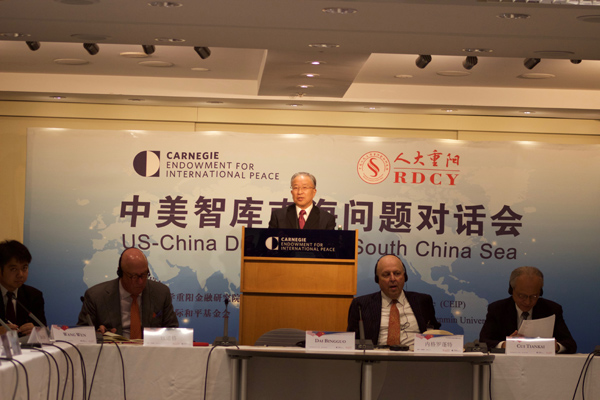
Former State councilor Dai Bingguo delivers a speech at the China-US Dialogue on South China Sea between Chinese and US think tanks in Washington on Tuesday. (Photo source: China Daily/Niu Yue)
WASHINGTON, July 5 (Xinhua) -- Dai Bingguo, China's former state councilor in charge of foreign affairs, on Tuesday called on related parties to cool the unreasonably hot South China Sea issue, warning of its potential dangers.
"If such momentum goes unchecked, accidents could happen and the South China Sea might sink into chaos and so might the entire Asia," Dai said in a keynote speech at a forum held at the Carnegie Endowment for International Peace, a U.S. think tank, one week before an expected arbitral ruling over the issue.
"Should that happen, countries around the South China Sea, the Asian countries and even the United States itself will suffer," Dai told a group of Chinese and U.S. experts on international law and foreign relations.
He said all countries concerned should make concrete efforts to let off the heat over the issue.
ARBITRATION RESULT NO MORE THAN "A PIECE OF PAPER"
With regard to the expected ruling by the Permanent Court of Arbitration in The Hague on July 12, Dai said it will be "nothing more than a piece of paper" and warned against any attempt to enforce the ruling in any form.
He stressed that the Philippines, which initiated the arbitration case against China, must be dissuaded from making any further provocation. "Otherwise, China will not sit idle," he said.
China has made its stance clear that it does not accept the arbitration and therefore has stayed away from the proceedings.
China has said that the arbitral tribunal has no jurisdiction over sovereignty issues which should be resolved by the two claimants themselves.
Dai noted that China's territorial claims to the South China Sea are based on abundant historical evidence and documents.
He said the United States recognized and respected China's sovereignty over the islands when China recovered them from Japanese occupation after World War II, and provided military vessels to ferry China's military and government personnel to Xisha and Nansha Islands to hold the restoration ceremony.
The islands' return to China is part of post-WWII international order and relevant territorial arrangements, Dai stressed.
COMMITMENT TO PEACEFUL RESOLUTION
The current U.S. stance of taking no position on the dispute "actually amounts to back-pedalling and defiance of the post-war international order, which the United States participated in building," he noted.
He pointed out that China, in fact, has been "completely at the receiving end of encroachments" in the South China Sea, as the Philippines, Vietnam and other countries have illegally occupied 42 islands and reefs in Nansha Islands by force.
He said that although China has the capability to recover the islands and reefs, it has all along exercised enormous restraint and sought a peaceful settlement through talks.
MORE CONSTRUCTIVE U.S. ROLE CALLED FOR
Dai said differences between China and the United States over the South China Sea issue should not be allowed to define the China-U.S. relations as these two countries have neither territorial disputes nor a fundamental clash of interests in the South China Sea.
Washington should honor its promise not to take sides over the dispute, and stop speculating that China is trying to compete with it for dominance in the region, Asia and the world as a whole, Dai added.
"We have no intention or capability to engage in 'strategic rivalry' with anyone. We have no ambition to rule Asia, still less the Earth," he said.
Dai urged Washington to scale back its "heavy-handed intervention" in the South China Sea issue through reinforcing military alliances, the forward deployment of military assets, and increasing close-in reconnaissance and the so-called "Freedom of Navigation" operations targeted at China.
Otherwise, it might fall into trouble against its own will and pay an unexpectedly heavy price, as certain countries stand to gain from great-power rivalry, he warned.
Dai said that as China and the United States have shared interests in peace and stability in Asia Pacific, they should find ways to manage their differences constructively and maintain communication on maritime issues.
Related:
Speech by Dai Bingguo at China-U.S. dialogue on South China Sea between Chinese and US think tanks
I am delighted to attend the China-U.S. dialogue on South China Sea between Chinese and U.S. think tanks jointly organized by the Carnegie Endowment for International Peace and Chongyang Institute for Financial Studies at Renmin University and meet with old and new friends. I would like to take this opportunity to thank both organizations for putting this dialogue together and my sincere thanks go to all of you here who have for long cared for and supported the development of China-U.S. relations.
I became honorary president of the Institute of International and Strategic Studies at Peking University after retiring from government. In this sense, I can also be counted as a think tank scholar. I very much look forward to having candid and in-depth exchanges with all of you for mutual enlightenment. Full story











